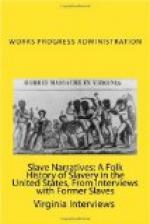“I wanted to visit mothah when I belong to Mahst’ Eubanks, but Becky say, ‘Yoh all best not see youh mothah, or yoh wan’ to go all de time’ then explaining, ‘she wan’ me to fohgit mothah, but I nevah could. When I cm back from d’ ahmy, I go home to mothah and say ‘don’ y’know me?’ She say, ‘No, I don’ know you.’ I say, ‘Yoh don’ know me?’ She say, ’No, ah don’ know yoh.’ I say, ‘I’se John.’ Den she cry and say how ahd growd and she thought I’se daid dis long time. I done ’splain how the many fights I’se in wit no scratch and she bein’ happy.”
Speaking of Abraham Lincoln’s death, he remarked, “Sho now, ah remembah dat well. We all feelin’ sad and all d’soldiers had wreaths on der guns.”
Upon his return from the army he married a young negress he had seen some time previous at which time he had vowed some day to make her his wife. He was married Christmas day, 1866. For a number of years he lived on a farm of his own near Glasgow. Later he moved with his family to Louisville where he worked in a lumber yard. In 1923, two years after the death of his wife, he came to Gary, when he retired. He is now living with his daughter, Mrs. Sloss, 2713 Harrison Boulevard, Gary.
Cecil C. Miller
Dist. #3
Tippecanoe Co.
Interview with Mr. John W. Fields,
ex-slave of Civil war period
September 17, 1937
[Illustration: John W. Fields]
John W. Fields, 2120 North Twentieth Street, Lafayette, Indiana, now employed as a domestic by Judge Burnett is a typical example of a fine colored gentleman, who, despite his lowly birth and adverse circumstances, has labored and economized until he has acquired a respected place in his home community. He is the owner of three properties; un-mortgaged, and is a member of the colored Baptist Church of Lafayette. As will later be seen his life has been one of constant effort to better himself spiritually and physically. He is a fine example of a man who has lived a morally and physically clean life. But, as for his life, I will let Mr. Fields speak for himself:
“My name is John W. Fields and I’m eighty-nine (89) years old. I was born March 27, 1848 in Owensburg, Ky. That’s 115 miles below Louisville, Ky. There was 11 other children besides myself in my family. When I was six years old, all of us children were taken from my parents, because my master died and his estate had to be settled. We slaves were divided by this method. Three disinterested persons were chosen to come to the plantation and together they wrote the names of the different heirs on a few slips of paper. These slips were put in a hat and passed among us slaves. Each one took a slip and the name on the slip was the new owner. I happened to draw the name of a relative of my master who was a widow. I can’t describe the heartbreak and horror of that separation. I was only six years old and it was the last time




